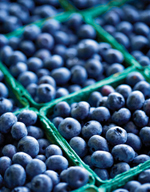|
Market
Update
“Blueberries in general did very, very well this year,”
said blueberry nurseryman and industry expert Dave Brazelton, owner
of Fall Creek Farm & Nursery in Lowell, Oregon. “Huge,
record crop in California, records in Oregon and Washington, record
in B.C.” He added that national numbers also look like a record.
Narrowing it down to Oregon, Brazelton said that growers in the
Beaver State received “record or near-record” returns
on their crops.
Asian Demand Exploding
 Brazelton
said growing demand in Asia, mainly for frozen product (“that
demand seems to be exploding”), has helped drive up production
and prices, especially for West Coast producers. Brazelton
said growing demand in Asia, mainly for frozen product (“that
demand seems to be exploding”), has helped drive up production
and prices, especially for West Coast producers.
From his nurseryman’s viewpoint, Brazelton said that while
there is still interest in new plantings, “it’s certainly
more moderated than it was five years ago, when it really peaked
in the Northwest. I think that’s a function of the overall
economy, the availability of credit, lots of factors.”
He added that unlike five years ago there are not a lot of “new
faces” entering the industry, with most of the growth coming
from existing growers “with a clear goals and plans.”
Himself surprised by the lack of elasticity, Brazelton said that
he would not have thought that sales would remain good as America
slumped into the recession. “Consumers have given up a lot
of things, but not their blueberries.”
Dark Cloud
But there is a dark cloud on the blueberry horizon, Brazelton said,
and that is the ultimate consequences for unfulfilled demand for
frozen product in 2011. “Frozen was really under-served this
year, even with the addition of significant frozen product from
Chilê, and that caused the (frozen) price to go very, very
high.”
There is serious concern about this because, as is the case with
hazelnuts when prices are high, food processors using blueberries
in their products will look for cheaper alternatives, such as frozen
strawberries. Food processors may also choose to use fewer blueberries
in their formulations.
“These high yet volatile prices may have been great for growers
this year, (but) it’s not great if we are trying to expand
consumption. It doesn’t send the right message and it’s
very difficult for new users to maneuver through that.”
As most in the industry know, it’s processed prices that greatly
influence what the floor prices will be for fresh product, Brazelton
said. “If fresh returns aren’t adequate, the risk is
higher in fresh so they change from fresh to process.” This
is more of an issue in peak-season, he added.
What can growers expect next year?
“On the one hand, with a large Chilêan crop and very
high prices depressing demand, that would indicate lower processed
prices next year,” Brazelton said. The flip side of that,
he added, is demand from Asia, which may not depress prices at all.
Personally, Brazelton thinks prices will drop “slightly”
in 2012.
Brazelton said that there has been a lot of interest in the newer
mid-season variety Draper. “It has performed really, really
well. The berries are very firm. It can be machine harvested and
they’re very high producing. Growers are finding they’re
as good as Duke (an early variety) if not better.”
Two other Michigan State-bred varieties, Aurora (late maturing)
and Liberty, “fill time slots that growers really want.”
“Could Have Been Better”
Packer/shipper Jeff Malensky of Oregon Berry Packing Company said
that 2011 could have been even better had it not been a late season
due to weaker pollinations in Oregon, Washington and British Columbia,
as was the case with other Willamette Valley crops.
“We were two and a half weeks later than normal. For the 12
years I’ve been here, two-and-half weeks late, that’s
never happened.” Subsequently, early market sales in July,
which bring higher prices, were not there.
“We still have a very active fresh market,” said Malensky.
“These new markets like Korea, we need them because production
continues to go up. The amount of acres put in the ground the last
five years are not even close to maturity.”
Malensky said that because frozen market demand has been strong
and prices high, “we fresh guys (in Oregon) had to really
be competitive and put out a high price.”
|
Articles:
Message from the Chairman
Seasonal
In-State Promotions Keep the Spotlight on Oregon Blueberries
Market Update
USHBC
to Discuss Assessment Hike
South
Korea Gets Fresh with Oregon
GAP
Answer to Fruit Safety Concerns
Spotted
Wing Drosophila Update
Blueberry
Production Research at the NWREC Highlights
Blueberry
Tree Project
Blueberries
Dropped from Pristine and Cabrio Labels
2012
Blueberry Day at the Ag Show, January 24, 2012
NRCS
Offers Financial Assistance for Energy Audits
|

 Brazelton
said growing demand in Asia, mainly for frozen product (“that
demand seems to be exploding”), has helped drive up production
and prices, especially for West Coast producers.
Brazelton
said growing demand in Asia, mainly for frozen product (“that
demand seems to be exploding”), has helped drive up production
and prices, especially for West Coast producers.